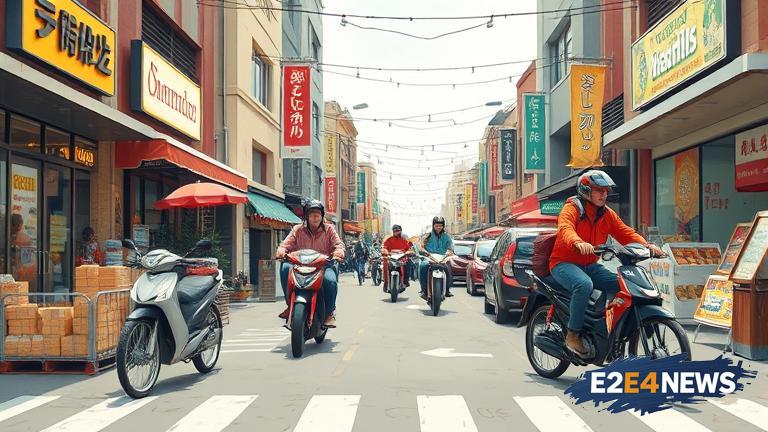In recent months, there has been a surge in the number of food delivery riders on the roads, particularly in busy shopping strips. These riders, who work for companies such as UberEats, Foodora, and Deliveroo, are often in a hurry to deliver food to customers, and as a result, they are engaging in reckless behavior, including speeding, running red lights, and riding on footpaths. This behavior is not only putting the riders themselves at risk but also pedestrians, cyclists, and other road users. The problem is particularly pronounced in busy shopping strips, where the presence of these riders is making footpaths lawless. Pedestrians are being forced to dodge riders who are riding at high speeds, and in some cases, riders are even colliding with pedestrians. The situation is so bad that some pedestrians are now too afraid to walk on the footpaths, and instead, are taking to the roads to avoid the riders. The authorities are struggling to keep up with the problem, and there are calls for tougher regulations to be put in place to curb the behavior of these riders. One of the main issues is that the riders are not being held accountable for their actions, and as a result, they are continuing to engage in reckless behavior. The companies that employ these riders are also being criticized for not doing enough to ensure that their riders are following the rules of the road. In some cases, the companies are even encouraging their riders to engage in reckless behavior by offering incentives for fast delivery times. The problem is not just limited to the riders themselves but also to the companies that employ them. There are also concerns about the impact that these riders are having on the environment, with many of them using petrol-powered vehicles, which are contributing to air pollution. Furthermore, the presence of these riders is also having an impact on local businesses, with some businesses reporting a decline in trade due to the chaos caused by the riders. The situation is a complex one, and it will require a multifaceted approach to solve. This includes tougher regulations, increased enforcement, and education campaigns to raise awareness about the dangers of reckless behavior. Additionally, the companies that employ these riders need to take responsibility for their actions and ensure that their riders are following the rules of the road. The authorities also need to invest in infrastructure, such as dedicated bike lanes, to ensure that riders can safely navigate the roads. In conclusion, the problem of reckless food delivery riders is a serious one that requires immediate attention. It is a complex issue that will require a coordinated effort from all stakeholders, including the authorities, companies, and riders themselves. By working together, we can create a safer and more sustainable transportation system that benefits everyone. The issue is not just limited to one country, but it is a global problem that requires a global solution. The rise of the gig economy has led to an increase in the number of food delivery riders on the roads, and it is essential that we find a way to regulate this industry to ensure that it is safe and sustainable. The use of technology, such as GPS tracking and data analytics, can also help to monitor the behavior of riders and identify areas where they are engaging in reckless behavior. This information can then be used to educate riders and companies about the dangers of reckless behavior and to develop strategies to prevent it. Ultimately, the key to solving this problem is to find a balance between the need for fast and efficient food delivery and the need for safety and sustainability. By working together, we can create a system that benefits everyone and ensures that our roads are safe and sustainable for all users.
